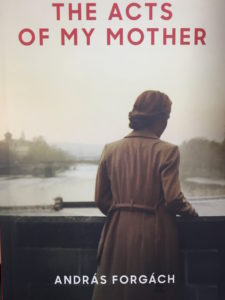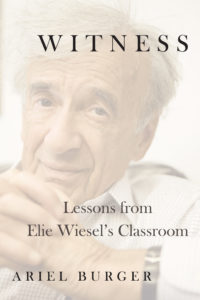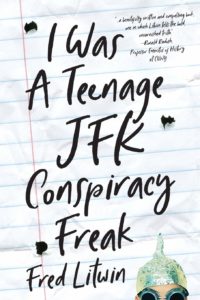Having trouble getting your adult friend or family member something for Hanukkah? Does he or she like to read? Here are a few literary ideas.
Fiction

• The Girl They Left Behind by Roxanne Veletzos. On a freezing night in January 1941, a young Jewish girl is found on the steps of an apartment building in Bucharest. As Natalia comes of age in a bleak and hopeless world after the war, traces of her identity pierce the surface of her everyday life, leading gradually to a discovery that will change her destiny. This is a sweeping family saga and love story that offers a vivid and unique portrayal of life in war-torn Bucharest and life behind the Iron Curtain during the Soviet occupation. Filled with strong female characters, this book is a strong portrait of the human spirit.

• The Family Tabor by Cherise Wolas. In this novel by the author of The Resurrection of Joan Ashby, Harry Tabor, a married man and father of three adult children, is about to be named man of the decade, a distinction that feels like the culmination of a life well lived. But cracks begin to appear in his smooth facade. His son hasn’t been sleeping through the night, and his daughters are having life and boyfriend troubles. His wife, Roma, knows her children are hiding things. What she doesn’t know – what none of them know – is that Harry is suddenly haunted by the long-buried secret that drove him to relocate his young family to the California desert decades ago.

• The Sisters of The Winter Wood by Rena Rossner. This lyrical fantasy novel, set in a Ukrainian shtetl, is about two sisters who discover their family’s magical legacy as external forces threaten them and their isolated town. Rossner, whose own ancestors escaped persecution, describes the book as her own family’s fairy tale, and as a Jewish resistance story not set in the Holocaust. A delight.
Non-fiction

• The Acts of My Mother by Andras Forgach. Thirty years after the fall of communism in Hungary, as Andras Forgach investigated his family’s past, he uncovered a horrifying truth: his mother, whom he deeply loved, had been an informant for the Kadar regime. She had informed not only on acquaintances, but also on family, friends and even her children. This is a personal expose of what happens when family and politics collide. Forgach gives voice to his deceased mother, holding her responsible for her deeds, while defending the memories he cherishes of her.

• Struck: A Husband’s Memoir of Trauma and Triumph by Douglas Segal. One of life’s biggest cliches becomes a horrific reality when Douglas Segal’s wife and daughter are hit head-on by a Los Angeles city bus. Following the accident, Segal began sending regular email updates to their circle of friends and family, a list that continued to grow as others heard of the event and were moved by the emotional and spiritual issues it raised. Harrowing, humorous, heartbreaking and hopeful, Segal’s memoir is an intimate and honest chronicle built around these email updates, and is a profound example of how people show up for one another in times of crisis.

Vasily Grossman: A Writer’s Freedom edited by Anna Bonola and Giovanni Maddalena. Vasily Grosssman was a successful Soviet author and journalist, but he is more often recognized in the West as Russian literature’s leading dissident. How do we account for this paradox? In this collection of essays that explore the Russian-Jewish author’s life and works, leading experts present recent multidisciplinary research on Grossman’s experiences, his place in the history of Russian literature, key themes in his writing and the wider implications of his life and work in the realms of philosophy and politics. This is a great read for Soviet history and politics buffs.

• Witness: Lessons from Elie Wiesel’s Classroom by Ariel Burger. In the vein of Tuesdays with Morrie, a devoted protege and friend of one of the world’s greatest thinkers takes us into the sacred space of the classroom, showing Holocaust survivor and Nobel Peace Prize recipient Elie Wiesel not only as an extraordinary human being, but as a master teacher, as well. Witness chronicles the intimate conversations between Burger and Wiesel over decades, as the author sought counsel on matters of intellect, spirituality and faith, while navigating his own personal journey from boyhood to manhood, and from student to rabbi and teacher.

• Dear Zealots: Letters from a Divided Land by Amos Oz, translated by Jessica Cohen. Dear Zealots is comprised of three powerful essays on the rise of zealotry in Israel and around the world. Oz writes about the universal nature of fanaticism and its possible cures, on the Jewish roots of humanism and the need for secular pride in Israel, and on the geopolitical standing of Israel in the Middle East and internationally.

• Child of the Holocaust by Jack Kuper. This is the harrowing true story of a young boy who’s exiled in Poland during the Second World War. This memoir of survival, originally published in 1980, has been hailed as a quintessential classic, as powerful as Anne Frank’s Diary of a Young Girl and has been celebrated for its rare beauty. Jack was nine when he came home to find everyone in his village taken by the Germans. Alone in the world, he wandered through Nazi-occupied Poland for four years, with no place to hide and no one he could trust. Kuper immigrated to Canada as a teenager and spent much of his career in advertising and as a filmmaker.

• I Was A Teenage JFK Conspiracy Freak by Fred Litwin. In this book, the author recounts how, as a teenager, he came to believe in a conspiracy to hide the truth about former U.S. president John F. Kennedy’s assassination, but then slowly moved to believe that Lee Harvey Oswald was the lone assassin. This is a great read for the skeptic in your circle.








